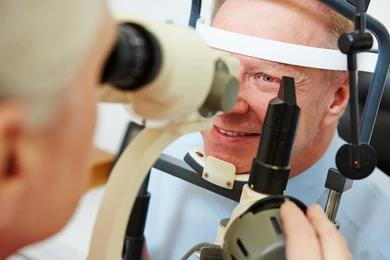Read Our Blog

Prevent Vision Loss Due to Diabetic Eye Disease
- posted: Nov. 05, 2021
Did you know that diabetic eye disease is a one of the most prevalent causes of blindness? Often there are no warning signs or symptoms, which is why early detection is critical to slowing the progression of vision loss.
According to the CDC, more than 34 million Americans have diabetes with 88 million having prediabetes. People with diabetes may be prone to cataracts, glaucoma and diabetic retinopathy. Diabetic retinopathy has no symptoms at the onset, but as the disease progresses, blurry vision may occur along with a condition known as macula edema.
While much is being done to prevent this disease, for those already affected, there are steps to take to preserve your overall health and vision.
- Take all of your prescribed medications.
- Practice a healthy lifestyle, including proper nutrition, exercise, and rest.
- Report any changes in vision to your eye care practitioner.
A comprehensive eye exam should include dilation at least once per year. Diabetic eye disease can be detected early and be treated before any vision loss may occur. Here are a few questions you can ask your eye care professional about eye diseases related to diabetes:
Here are some questions you can ask your doctor to get the discussion started:
- What kind of tests will I have identify the vision problem?
- What caused my condition and how is it treated?
- Are there foods, drugs, or activities I should avoid while I’m on this treatment?
- How will this condition affect my vision now and in the future?
- What lifestyle changes should I consider?
Family Vision Center is taking the opportunity during November’s Diabetic Eye Disease Month to let people know that diabetics should be proactive in their eyecare to slow the progression of eye disease. Contact us today to schedule your next eye exam.

Prevent Vision Loss Due to Diabetic Eye Disease
- posted: Nov. 05, 2021
Did you know that diabetic eye disease is a one of the most prevalent causes of blindness? Often there are no warning signs or symptoms, which is why early detection is critical to slowing the progression of vision loss.
According to the CDC, more than 34 million Americans have diabetes with 88 million having prediabetes. People with diabetes may be prone to cataracts, glaucoma and diabetic retinopathy. Diabetic retinopathy has no symptoms at the onset, but as the disease progresses, blurry vision may occur along with a condition known as macula edema.
While much is being done to prevent this disease, for those already affected, there are steps to take to preserve your overall health and vision.
- Take all of your prescribed medications.
- Practice a healthy lifestyle, including proper nutrition, exercise, and rest.
- Report any changes in vision to your eye care practitioner.
A comprehensive eye exam should include dilation at least once per year. Diabetic eye disease can be detected early and be treated before any vision loss may occur. Here are a few questions you can ask your eye care professional about eye diseases related to diabetes:
Here are some questions you can ask your doctor to get the discussion started:
- What kind of tests will I have identify the vision problem?
- What caused my condition and how is it treated?
- Are there foods, drugs, or activities I should avoid while I’m on this treatment?
- How will this condition affect my vision now and in the future?
- What lifestyle changes should I consider?
Family Vision Center is taking the opportunity during November’s Diabetic Eye Disease Month to let people know that diabetics should be proactive in their eyecare to slow the progression of eye disease. Contact us today to schedule your next eye exam.
Locations
Office & Optical Hours
Office Hours
Monday, Tuesday, Friday
9:00 am - 5:30 pm
Wednesday, Saturday
8:30 am - 3:00 pm
Thursday
9:00 am - 7:00 pm
Sunday
Closed
Optical Hours
Monday, Tuesday, Friday
9:00 am - 4:30 pm
Wednesday, Saturday
8:30 am - 2:00 pm
Thursday
9:00 am - 6:00 pm
Sunday
Closed


